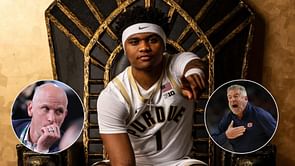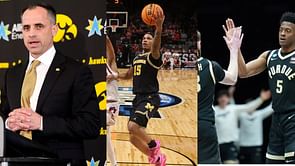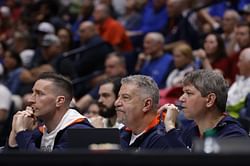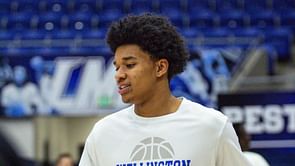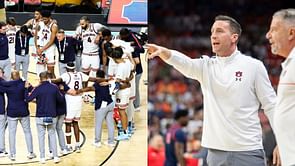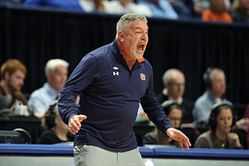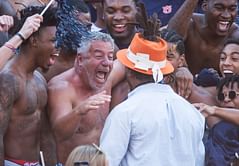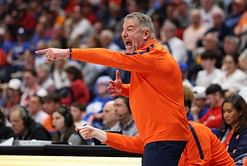
Bruce Alan Pearl, born on March 18, 1960, is a prominent American college basketball coach renowned for his tenure as the head coach of the Auburn Tigers men's basketball team. With an illustrious coaching career spanning various teams, including Tennessee, Milwaukee, and Southern Indiana, Pearl has garnered significant accolades and achievements within the basketball realm.
| Name: | Bruce Alan Pearl |
| Net Worth: | $5 million |
| Age: | 63 |
| Residence: | Auburn, Alabama |
| Position: | Head Coach, Auburn Tigers |
| Marital Status: | Not specified |
| Source of Wealth: | Coaching contracts, endorsements, bonuses |
| Salary: | $5.4 million annually (base) |
| Endorsements: | $2,575,000 annually |
| Endorsement Earnings: | $125,000 escalator each year |
Bruce Pearl's Net Worth
Over the years, his net worth has been shaped by his successful coaching career, numerous achievements, and endorsement deals.
Bruce Pearl's Career Earnings
Exact figures for Bruce Pearl's career earnings are not available. However, given his extensive coaching experience and high-profile positions, it's evident that he has amassed substantial earnings throughout his career.
Bruce Pearl's Salary
Bruce Pearl recently signed a contract extension with Auburn, securing his position as the head coach until 2030. The contract stipulates a base salary of $5.4 million annually, with incremental increases of a quarter of a million dollars each year.
Bruce Pearl's Contract
Pearl's new contract with Auburn runs through 2030, offering him a base salary of $5.4 million annually, with additional escalator clauses. Including endorsements and appearance payments, Pearl is entitled to various additional bonuses and incentives.
These bonuses include
1. Performance Bonuses:
$100,000 for winning an SEC regular-season title.
$50,000 for winning the SEC Tournament.
$50,000 for being voted SEC Coach of the Year by the league’s coaches or the Associated Press.
$50,000 for being named National Coach of the Year (either the Naismith Coach of the Year, AP Coach of the Year, USA Today Coach of the Year, or NABC Coach of the Year).
$50,000 for earning an NCAA Tournament berth.
$50,000 for making it to the Sweet 16.
$100,000 for making it to the Elite Eight.
$100,000 for advancing to the Final Four.
$100,000 for advancing to the national title game.
$200,000 for winning a national championship.
2. Escalator Clauses:
An annual $250,000 escalator in his base salary.
An annual $125,000 escalator in his endorsement rights.
An annual $125,000 escalator in his appearance payments.
Bruce Pearl's Contract Breakdown
| Year | Base Salary | Signing Bonus | Cap Hit | Dead Cap | Yearly Cash |
| 2023 | $5.4 million | - | - | - | $5.4 million |
| 2022 | $3.8 million | - | - | - | $3.8 million |
| 2021 | $3.93133 million | - | - | - | $3.93133 million |
| 2020 | $3.8 million | - | - | - | $3.8 million |
| 2019 | $2.6 million | - | - | - | $2.6 million |
| 2018 | $2.5 million | - | - | - | $2.5 million |
| 2017 | $2.5 million | - | - | - | $2.5 million |
| 2011 | $1.5 million | - | - | - | $1.5 million |
Bruce Pearl's Contract History
Bruce Pearl has held coaching positions at Tennessee, Milwaukee, and Southern Indiana, where he achieved notable success, including a Division II national championship. His coaching journey also includes assistant roles at Stanford and Iowa.
FAQ's on Bruce Pearl Net Worth, Salary, and Contract
A. Bruce Pearl's net worth is estimated at $5 million as of 2024.
A. Bruce Pearl earns a base salary of $5.4 million per year as the head coach of the Auburn Tigers men's basketball team. Additionally, he receives $2,575,000 annually from endorsements.
A. Yes, Bruce Pearl has received several coaching awards throughout his career, including being named Coach of the Year by Sporting News in 2006 and being awarded the Adolph Rupp Cup in 2008.
A. Bruce Pearl's salary has increased significantly over the years. In 2011, he earned a base salary of $1.5 million, which has since risen to $5.4 million annually as of 2023.
A. Bruce Pearl has led his teams to four conference championships, three conference tournament championships, and ten NCAA tournament appearances, including one Final Four appearance. He also won a Division II national championship with Southern Indiana in 1995.
